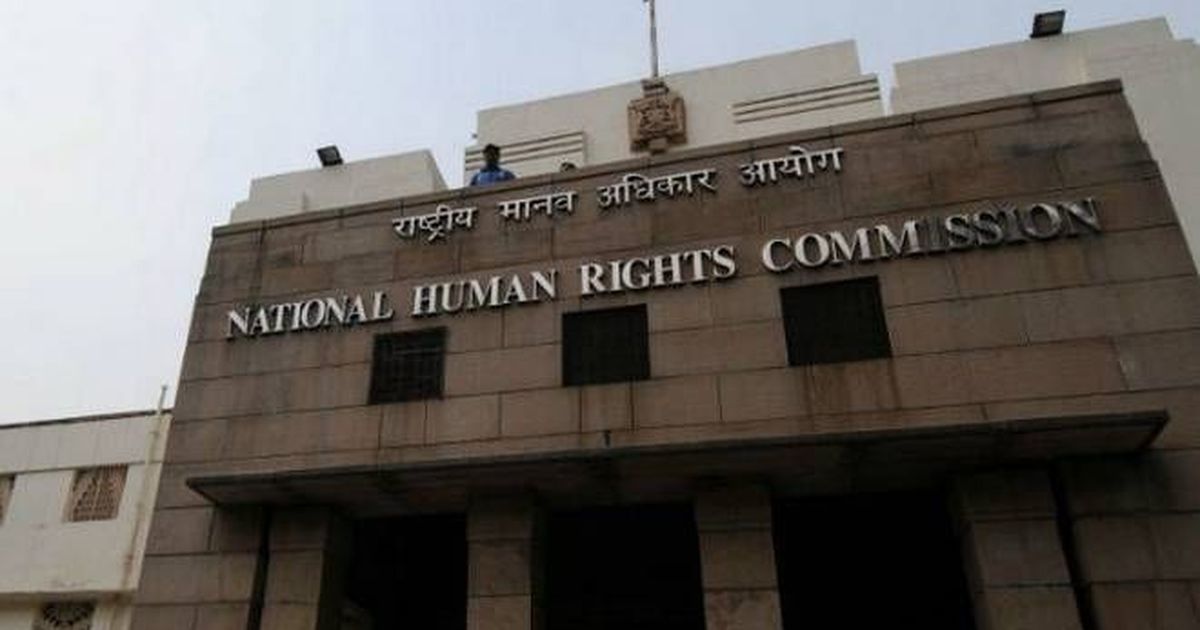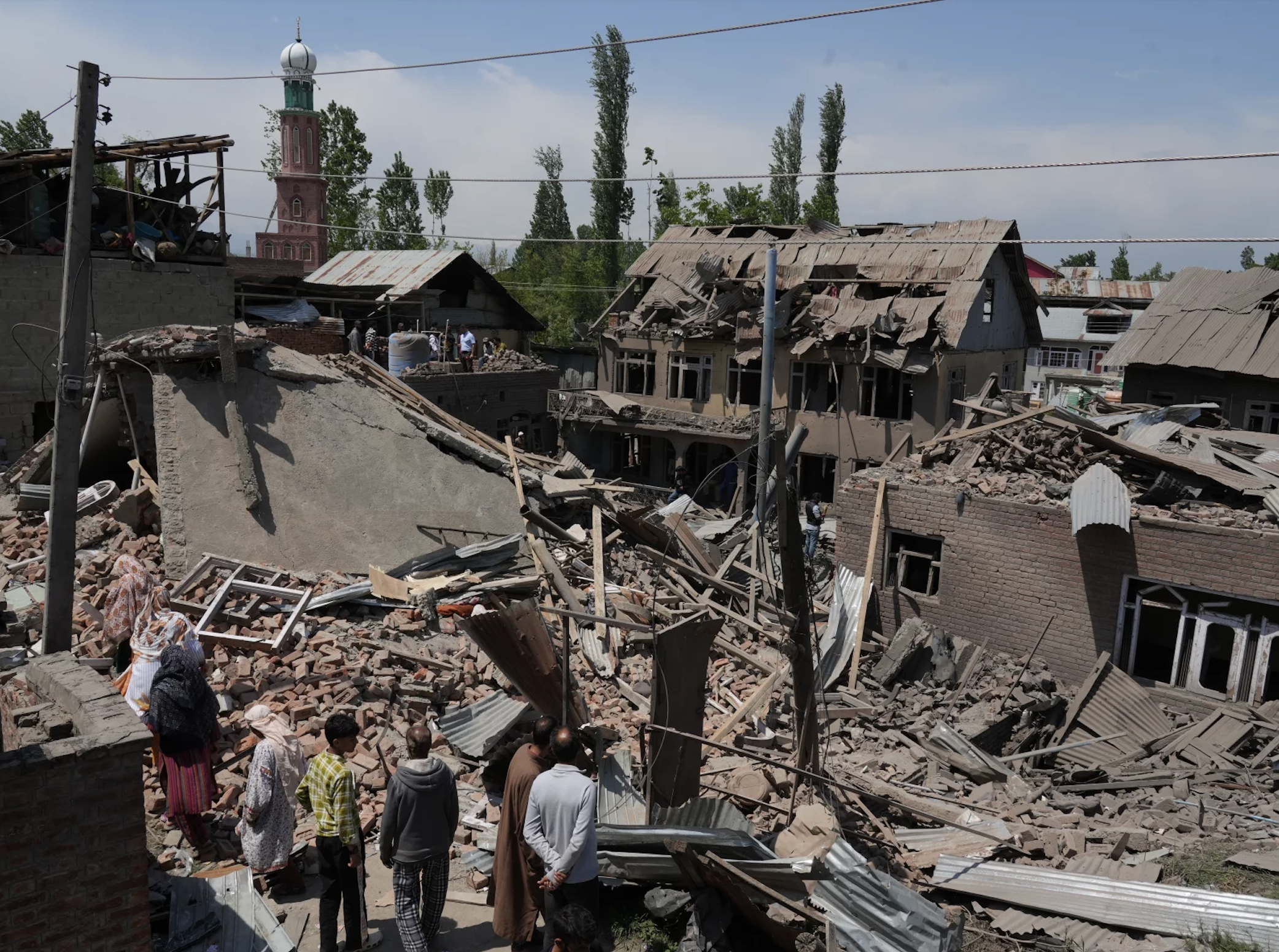
By Tarique Anwar / News Click
New Delhi: The communal venom being spewed allegedly by the ruling dispensation and its proxies with complete impunity, through a series of hate speeches, to polarise and reshape the constitutionally protected secular republic into a Hindu Rashtra, has started creating a disturbing impact.
From Khargone in Madhya Pradesh to Sabarkantha’s Himmatnagar and Anand’s Khambhat in Gujarat, from Bankura’s Machantala and Howrah’s Shibpur in West Bengal to Baina area of Vasco in Goa, from Lohardaga in Jharkhand to Karauli in Rajasthan and Kolar district’s Mulbagal locality in Karnataka and even in Odisha — there is an eerily similar pattern of violence that took place on April 10 during the Ram Navami processions.
Large processions (allegedly armed in many cases), violation of routes decided by the local administration, emphasis on making the rallies pass through Muslim-concentrated areas, provocative songs and slogans being played loud, stone-pelting, torching and arson, the delayed, inadequate or partisan response of the police and curfew are the common threads that run through the violence in all the states mentioned above.
Following are the lyrics of the few songs that were being played out: “Har Har Mahadev Ka Nara Hindustan Bolega, Topi Wala Bhi Sir Jhuka Kar Jai Shri Ram Bolega…” “Jis Din Khaula Khoon Mera Dikhla Denge Auqat Teri, Phir to Hum Nahi Bolenge Bas Bolegi Talwar Meri…”
Another common aspect in these incidents is that in all these states, the Bharatiya Janata Party (BJP) and its proxies, such as the Vishwa Hindu Parishad (VHP), the Bajrang Dal, the Hindu Jagran Manch, etc., are under the scanner for allegedly playing a role in spreading unrest.
The role of the administrations in Madhya Pradesh, Gujarat and Bihar has been questioned as they permitted such processions to pass through minority areas without adequate preparation.
A number of viral videos show Hindutva groups playing loud, objectionable songs through DJs in front of mosques and later desecrating the religious places.
In the first such incident, which occurred in Khargone, Madhya Pradesh, it is no coincidence that ruling Bharatiya Janata Party (BJP) leader Kapil Mishra, whose hate speech had allegedly resulted in communal violence in Delhi in February 2020, was attending the Shriram Janmotsav Shobha Yatra in the area.
Sharing photos and videos of the procession, he tweeted, “Na Musa na Burhan, Bas Jai Shree Ram. Hamari Ramnavmi yatra Khargone Madhya Pradesh me shuru.” [Neither Musa nor Burhan (separatist militants who were killed in Kashmir), there will only be the chants of Jai Shri Ram. Our Ram Navami procession at Khargaon in Madhya Pradesh has begun.]
An uneasy calm is prevailing in these areas, with reports of sporadic incidents of violence pouring in till April 12. FIRs have been filed, and arrests have been made, but the police are tight on the details.
Khargone District Collector (DC) P Anugraha said there is no clarity on what triggered the clash, but the locals claimed it happened after provocative songs and slogans were raised outside the Talab Chowk mosque.
At a time when the police are not ready to reveal what led to violence and said investigations are underway, Madhya Pradesh Home Minister Narottam Mishra, while speaking to the media in Bhopal, said, “Jis ghar se pathar aae hai, us ghar ko hi patharo ka dher banaenge (the houses from where stones were hurled will be turned into rubble). The action will be taken after identifying them.”
The statement is enough to indicate what kind of police action will be taken as well as on the impartiality of investigations. A day after communal clashes erupted, the district administration, on April 11, carried out a demolition drive, razing 16 houses and 29 shops in five localities of the town.
As many as 84 people (the majority of them Muslims) have been arrested from Khargone so far.
The Madhya Pradesh government went a step ahead. Properties of those accused of being “rioters” (the majority of them are from the minority community) were demolished without even following the due process of law.
However, the authorities justified the action — arguing that the constructions were done on encroached land, and the demolition was carried out without targetting any community.
“Illegal structures came up over the years on encroached land have been brought down. The drive will continue for the next few days. Stone pelting had also been done from these areas after which action was taken,” said Sub Divisional Magistrate Milind Dhoke.
Of the 12 shops demolished in the Talab Chowk area, eight were run by Muslims, and the remaining four were by Hindus. All the 12 shops were part of the Khargone Jama Masjid complex and owned by the masjid committee.
Khargone and Barwani districts, which have been witnessing communal incidents, are dominated by tribals and a stronghold of the Congress party. Assembly polls are due next year.
Gujarat will also be going to the polls by the end of this year.
Violence During Ram Navami Not a New Affair
Violence during Ram Navami celebrations is not a new affair in North India. The past few years have seen isolated incidents of violence on this occasion.
In 2018, a series of violence erupted in nine districts of Bihar, suggesting professional orchestration and meticulous planning. The violence from March 25-28, 2018 claimed one life, and around 65 were injured. The, too, the pattern of violence seemed synchronised. The Assembly elections were held in 2020.
NewsClick had then investigated the clashes and reported that swords, CDs and pen drives — containing Islamophobic songs — were distributed to be played on loudspeakers during the Ram Navami processions. The lyrics of the songs were so provocative and seemed designed to spur violence.
The Seeds of Violence
Hate speeches have been stoking communal tensions in the country where even small triggers have incited mass-death tragedies. It already resonates with increasingly emboldened vigilante groups.
Hindutva vigilante groups keep thrashing people in the name of disrespecting cows, harassing and dragging out couples from trains, cafes and homes on suspicion that Hindu women might be seduced by Muslim men and barging into religious gatherings where they suspect people are being converted.
Political analysts say such incidents are bound to happen every now and then, as hate speeches are being normalised by political leaders and law enforcement agencies, which offer “tacit endorsements” by not directly addressing such divisive issues.
Even after the call for ‘genocide’ of Muslims was given at the Haridwar Dharma Sansad (religious assembly) in December 2021, Prime Minister Narendra Modi and his top leaders chose to stay silent, except Vice President Venkaiah Naidu, who warned that “inciting people against each other is a crime against the nation.”
He made the statement without making any specific reference.
Rohinton Fali Nariman, a retired Supreme Court judge, said in a public lecture: “You have persons giving hate speech, actually calling for the genocide of an entire group, and we find reluctance of the authorities to book these people.”
“Unfortunately, the other higher echelons of the ruling party are not only being silent on hate speech but almost endorsing it,” he said.
Out on bail in a hate speech case, Yati Narsinghanand aka Deepak Tyagi (a self-proclaimed monk) repeated the offece, and this time in the national capital. Addressing a gathering in Burari ground, he told Hindus to take up arms. He is still out, despite violation of bail conditions.
Karnataka Rural Development and Panchayat Raj Minister KS Eshwarappa made provocative statements to fuel hatred between religions after Bajrang Dal worker Harsha’s murder in Shivamogga on February 20.
While addressing an event in Gujarat’s Ahmedabad, Manoj Kumar, national president of the Rashtriya Bajrang Dal, made a hate speech against the Muslim community on April 7. He also made some derogatory comments. He is also associated with Praveen Togadia’s Right-wing outfit VHP.
On February 28, during UP Assembly elections, Chief Minister Ajay Bisht (Yogi Adityanath) had said the Bahujan Samaj Party’s (BSP) list of candidates resembled the Muslim League’s. Bisht later claimed that the ‘Muslim-league-like’ list proved that the party would not give equal representation to all sections and regions — a statement aimed at inciting communal aggression.
He even spoke on February 14 (during the second phase of the elections) of Muslims as the “other”, using terms like “Ghazwa-e-Hind” and “religious fanatics” of “Talibani thinking”. He said, “India will run according to the Constitution, not Shariat.”
Similarly, repeat hate-offender BJP MLA Raghvendra Pratap Singh used vile language during his election campaign, stating that any Hindu who does not vote for him has “Miyan (slang for Muslims) blood in his veins.”
He went on to call people “traitors, b***ard sons of Jaichand, h****khor sons of his father” and threatened to “destroy” them if they betrayed the Hindu religion.
The Domariyaganj MLA promised to forcibly convert Muslims and replace skull caps with tilaks if voted to power.
But, he has not faced any consequences for his actions so far.
Another hate monger, Amethi BJP MLA Mayankeshwar Singh, encouraged voters to commit acts disrespecting Islam and Muslims by “pulling the their beards to make chotia”( ponytail sported by Brahmins).
Worse still were BJP MLA Fateh Bahadur Singh’s threats while seeking re-election from Gorakhpur’s Caimpiyarganj. He told the Muslim community in the area to vote for him; otherwise, the group of 200 Muslims would be “branded”.
Reminding them of their minority strength, he warned them that region would not see any infrastructural development if they “cause any trouble”.
He is a six-time MLA, a former state forest minister and the son of former UP Chief Minister Vir Bahadur Singh.
Seeking his re-election, BJP leader Raghvendra Singh had threatened on February 14 that Muslims would wear tilak if he got another chance as an MLA.
Aside from such vocal instances, the Hindustan Times also reported as many as 40,395 correct complaints of violation of the Model Code of Conduct (MCC) only related to the 2022 Assembly elections between February 10 and March 7.
A 19-year-old girl, a member of the Akhil Bharatiya Vidyarthi Parishad (ABVP), a student wing of the Rashtriya Swayamsevak Sangh (RSS), recently openly called for genocide against Muslims at a recent protest against hijab (veil) in Vijayapura in Karnataka.
“If you ask for water, Indians will give you juice. If you ask for milk, we will give you kheer (a sweet dish made of milk). But, if you want hijab all over India, we will chop you all with Shivaji’s sword,” she said amid applause.
After her video went viral, the district police registered a suo motu case against the teenager.
BJP National General Secretary CT Ravi raised a new controversy when he called the sale of ‘halal‘ (‘permissible’ in Islam) meat an “economic jihad”. He also called for a boycott of meat sold by Muslims.
Leaving no stone unturned, a new hate campaign targetting Muslims has now been launched in Kerala. It is centred on the allegation that Muslim restaurants serve food to their customers after “spitting” into it. The News Minute reported both Hindutva groups and radical Christians are actively circulating a district-wise and even area-wise list of “spit-free hotels” on WhatsApp groups.
This article first appeared on newsclick.in





